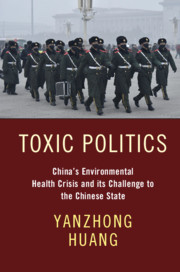Book contents
- Praise for Toxic Politics
- Toxic Politics
- A Council on Foreign Relations Book
- Toxic Politics
- Copyright page
- Dedication
- Contents
- Figures
- Tables
- Acknowledgments
- Abbreviations
- Introduction
- Part I The Health and Nonhealth Impacts
- Part II The Government Response
- Chapter 3 Evolving Environmental Health Policy
- Chapter 4 Implementing Environmental Health Policy
- Chapter 5 An Assessment of Policy Effectiveness
- Conclusion
- Notes
- Index
Chapter 3 - Evolving Environmental Health Policy
from Part II - The Government Response
Published online by Cambridge University Press: 18 September 2020
- Praise for Toxic Politics
- Toxic Politics
- A Council on Foreign Relations Book
- Toxic Politics
- Copyright page
- Dedication
- Contents
- Figures
- Tables
- Acknowledgments
- Abbreviations
- Introduction
- Part I The Health and Nonhealth Impacts
- Part II The Government Response
- Chapter 3 Evolving Environmental Health Policy
- Chapter 4 Implementing Environmental Health Policy
- Chapter 5 An Assessment of Policy Effectiveness
- Conclusion
- Notes
- Index
Summary
In accounting for the shift in China’s environmental health policy, there is no denying that domestic actors – politicians, bureaucrats, intellectuals, environmentalists and social forces – are instrumental in setting the new agenda. However, a close look at the policymaking process also highlights the influence of international actors and networks in creating new policy norms and practices, as evidenced by US Foreign Service’s role in including PM2.5 control as a core tenet in the government’s pollution control efforts. The shift to a new monitoring system, in turn, forced the government to take more action on pollution. Ultimately, the PM2.5 crisis of 2013 weaved the problem, policy, and political streams together, pushing all toward serious policy change. By April 2015, the government had put in place three action plans to tackle the country’s air, water and soil pollution problems, respectively. Nevertheless, the same process also reveals the inherent dilemmas, constraints, and limitations China faces in pursuing required policy change.
Keywords
- Type
- Chapter
- Information
- Toxic PoliticsChina's Environmental Health Crisis and its Challenge to the Chinese State, pp. 85 - 116Publisher: Cambridge University PressPrint publication year: 2020

